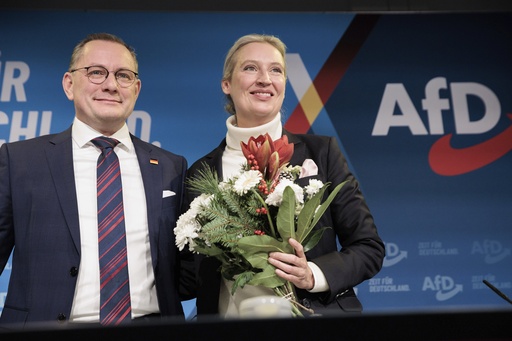
The far-right political organization known as the Alternative for Germany (AfD) has announced Alice Weidel as its candidate for chancellor in the upcoming election in Germany.
Despite her nomination, it is highly unlikely that Weidel will secure the chancellorship due to the widespread refusal of other political entities to collaborate with the AfD, which has roots dating back to 2013.
The party has been gaining significant popularity, currently ranking as the second most powerful party in the nation, trailing only the center-right Christian Democrats.
Recent polls have indicated that the AfD is receiving between 18% and 19% support from the electorate.
This marks a historic moment for the AfD, as it is the first time the party has put forward its own candidate for the high office of chancellor.
Weidel openly expressed her ambition for the country, stating, “We aim to propel Germany forward again and reclaim our position of prominence on the global stage,” while accepting her nomination.
The 45-year-old economist articulated her plans to revive Germany’s struggling economy, reverse the ongoing transition towards climate-friendly energy solutions, and implement stringent measures to regulate immigration.
The party’s staunch anti-immigration policies have incited considerable backlash, especially after recent allegations regarding plans by various far-right factions in Germany to deport millions of immigrants and their descendants if placed in power.
This controversy spurred weeks of protests throughout the country last winter but also resulted in the AfD’s inaugural success in state elections, particularly a win in Thuringia last September.
Weidel labeled irregular migration to Germany as “the source of all evil” during her speech on Saturday.
Recently, Chancellor Olaf Scholz’s coalition government disintegrated, and he is currently managing the country through a minority government.
Scholz is scheduled to propose a confidence vote in parliament on December 16, where he is anticipated to face defeat, likely leading to an election set for February 23.
The discontent among the populace regarding Scholz’s administration—characterized by internal conflicts, rising inflation, and an ailing economy—combined with burgeoning anti-immigration sentiment and skepticism towards military assistance to Ukraine, has contributed significantly to the AfD’s growing support.
Support for the AfD is notably prevalent in the eastern regions of Germany, with the domestic intelligence service monitoring the party’s factions in Saxony and Thuringia due to their classification as “proven right-wing extremist” groups.
Other individuals expected to contend for the chancellorship include the current Chancellor Scholz representing the center-left Social Democrats, Friedrich Merz from the Christian Democrats, and Robert Habeck from the Green Party.
